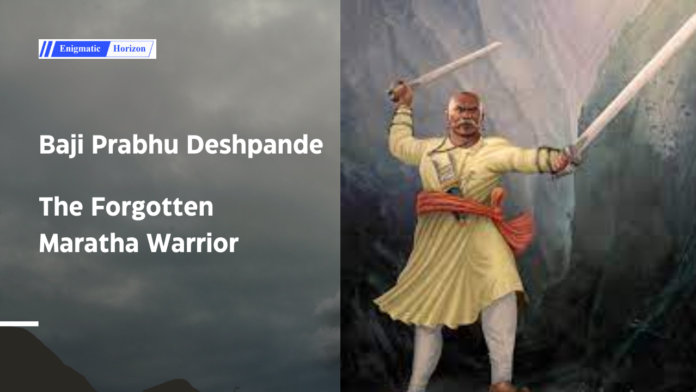Priyal Dholakia
”Looking at him soaked in blood from head to toe,
Fighting with a sword in both hands,
Was like looking at the rising sun,
Glowing red and shunning away the darkness.”
This is how a great poet praised the heroism of Baji Prabhu Deshpande.
But the relentless sacrifices of this brave warrior have been buried in the pages of history. Let us take a look at the story of this dauntless Maratha combatant.
India has long been a land of fearless warriors and courageous monarchs. Every nook and corner of the country is brimming with great tales of valor. Since ancient times, the Indian subcontinent has seen narratives of bravery and triumph. It has seen warriors who have attained martyrdom in the pursuit of preserving India’s honor. These warriors have defeated every invader who has tried to undermine Indian civilization.
Yet, it is unfortunate to see that the majority of these legends are not passed to our new generation. As a result, these valiant warriors are being forgotten. Baji Prabhu Deshpande was one such legendary warrior. This is his story of how he led 300 Maratha soldiers against an army of 10,000+ forces of Adil Shah at the Pavan Khind Pass.
Baji Prabhu Deshpande was one of the most heroic and courageous Maratha warriors of all time. He sacrificed his own life in the service of his king, Chhatrapati Shivaji Maharaj. Baji Prabhu Deshpande is an important figure in Marathi folklore and culture. There are several regional plays and songs dedicated in his honor.
The legend of Baji Prabhu Deshpande is linked to a pivotal battle known as the ‘Battle of Pavankhind.’ It was due to this battle that Chhatrapati Shivaji Maharaj was able to flee the Panhala fort. Here, Baji Prabhu made the ultimate sacrifice of his life by assisting his king’s escape. Here is how.
The Siege of Panhala Fort and the Heroic Stance of Baji Prabhu Deshpande
Adil Shahi forces had laid siege on the Maratha Fort of Panhala and trapped the Maratha forces. But, the army of Chhatrapati Shivaji Maharaj was able to put up a strong defense and break free from there. The army soon approached the Ghodkhind Pass (also called the Horse Pass). It was then when Baji Prabhu resolved to make a brave last stand to protect their King.
He let Shivaji Maharaj and another 300 troops to flee to Vishalgad fort. While, he offered to stay behind with the other soldiers at the Ghodkhind Pass. Though reluctant at first, Shivaji Maharaj eventually agreed to this. He declared that he will fire three cannon balls to signal his safe arrival on Vishalgad. Baji Prabhu and his faithful 300 Marathi warriors blocked the Ghodkhind pass. They clashed with 12000 strong Adilshahi forces led by Siddhi Johar.
The valiant 300 Maratha fought for about 15 hours. Despite being severely injured, Bajiprabhi fought on. Soldiers after soldiers were martyred while facing an endless stream of enemy soldiers. But as the fight progressed, it became clear which military side was more superior. And which side had their weights down. What may have been a few minutes of fighting escalated into a massacre of Adil Shah’s forces. Baji Prabhu was stabbed and sustained many injuries. Even then, he refused to quit till he heard the three cannon shots to ensure his Maharaja’s safety. Chants of “Har Har Mahadev” echoed all over as each Maratha soldier took on the enemy one by one.
Meanwhile, Shivaji Maharaj was able to reach the Vishalgad fort. The sounding of three cannon rounds marked his safe arrival there. Upon hearing the cannon shots, the proud Baji Prabhu Deshpande gracefully attained martyrdom. To honor Baji Prabhu and the other 299 Maratha soldiers who gave their lives for Swarajya, Shivaji Maharaj renamed the “Ghodkhind Pass” as “Pavan Khind.”
Baji Prabhu Deshpande will remain one of the most glorious icons of India’s history. Every year, people in Maharashtra commemorate Baji Prabhu Punya Tithi in his honor. It is critical that we remember and learn from the sacrifices of these forgotten heroes. Also, pass on their stories of unwavering fortitude to future generations. After all, it is only because of them that we are able to reap our cultural glories to this day.
